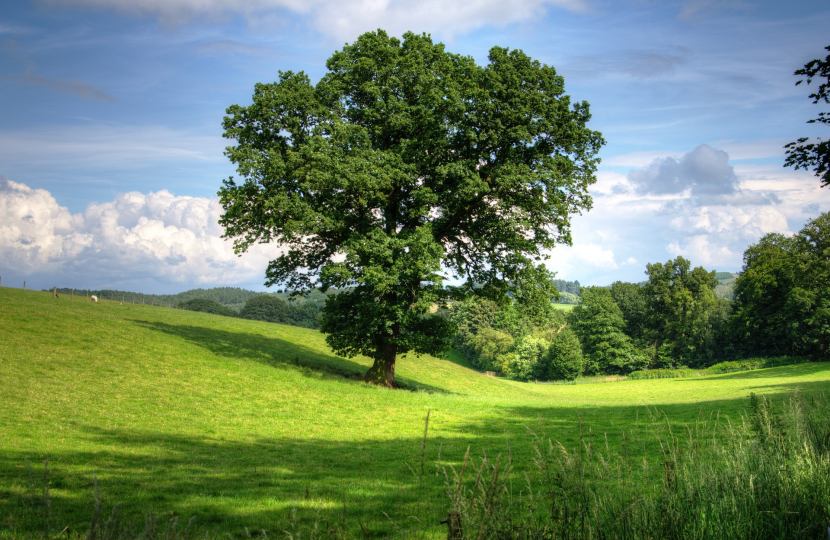
Claims that the Government is rowing back on commitments to our farming reforms or nature are wholly untrue. Since the Conservatives took office in 2010, we have presided over the most environmentally progressive government in British history. The UK has decarbonised our economy faster than any country in the G20 over the last two decades, driven in large part by our support for renewables. Since 2010, 99 per cent of all solar panels in the UK have been installed, and we now have the largest offshore wind energy supply in the world.
We have led the world, being the first developed economy to legislate to be net-zero by 2050 or sooner. Beyond that, legislation passed under the auspices of the Environment Act, Fisheries Act, and Agriculture Act, collectively form the most dramatic and transformational legislative change to our environment and nature as a whole. These Acts of Parliament set out the framework to deliver our commitments, which are the most comprehensive and ambitious of any advanced economy.
Regarding your specific concerns, I am aware that the purpose of speeding up the planning system in defined Investment Zone areas is to cut back on unnecessary bureaucratic requirements and processes that slow down high-quality development or make it more complex than it needs to be. This includes removing burdensome EU requirements which create paperwork and stall development, but importantly, do not necessarily protect the environment; focusing developer contributions on essential infrastructure requirements; and reducing lengthy consultation with statutory bodies. I understand from the Department for Levelling Up, Housing and Communities that key planning policies which ensure developments protect our precious natural heritage and maintain national policy on Green Belt will continue to apply.
On farming, as we are no longer in the European Union, the UK is free from the Common Agricultural Policy, which did little for the environment. The Government’s 2019 Manifesto was clear that the Government would maintain the budget for farming but spend it in a way that does better for farming and nature. My colleagues in Defra want to support the choices that individual farmers make for their farms, boost food production, agricultural productivity, and enhance the natural environment. This in turn will bolster the rural economy and support communities across the country. The Government is rolling out new schemes that will support farmers to both produce high-quality food and enhance the natural environment. I look forward to reading more about these schemes as further details are announced. We have the chance to have a farming industry that is more independent and financially resilient, while returning nature to the land and improving the natural assets that support food production, such as high-quality soil.
Turning to your final bullet point. Biodiversity loss is a global problem that needs a global solution, and the UK is committed to playing a leading role in developing an ambitious post-2020 global biodiversity framework to be adopted at COP15 of the Convention on Biological Diversity.
As part of the global biodiversity framework, the UK will be advocating for ambitious global targets to halt and reverse biodiversity loss by 2030. This includes targets to ensure at least 30 per cent of the global land and of the ocean is protected, ecosystems are restored, species population sizes are recovering, and extinctions are halted by 2050. Further, the UK’s Presidency of the United Nations Climate Summit (the UN Framework Convention on Climate Change) placed nature at the heart of COP26. I know that the Government’s priority is to continue to ensure there is global recognition that biodiversity loss and climate change is inextricably linked, and that action on nature is vital for achieving Paris goals. I am proud of our leadership; bringing parties together and building consensus through partnerships such as the Leaders’ Pledge for Nature, which has now been endorsed by more than 90 political leaders. At the G7 Summit in 2021, Leaders agreed the Nature Compact, setting out commitments to reverse biodiversity loss by 2030.
Domestically, as you mention, our Environment Act sets a new, historic legally binding target to halt the decline in species abundance by 2030. This is a core part of Ministers’ commitment to leave the environment in a better state than we found it and is supported by the powerful package of new policies and tools in the Act. Biodiversity net gain, Local Nature Recovery Strategies and a strengthened biodiversity duty on public authorities will work together to drive action, to create or restore rich habitats that enable wildlife to recover and thrive, while conservation covenants will help secure habitat for the long term.
Finally, the Government is investing over £750 million in the Nature for Climate Fund and is expanding on the 364,000 football pitches of priority habitat which has been created or restored since 2010 through the establishment of the Nature Recovery Network. This is all part of the programme of work to deliver our international commitments domestically under the 25 Year Environment Plan.
I agree with you about the importance of nature and the environment. I am fully committed to ensuring improvements both at home and abroad.



